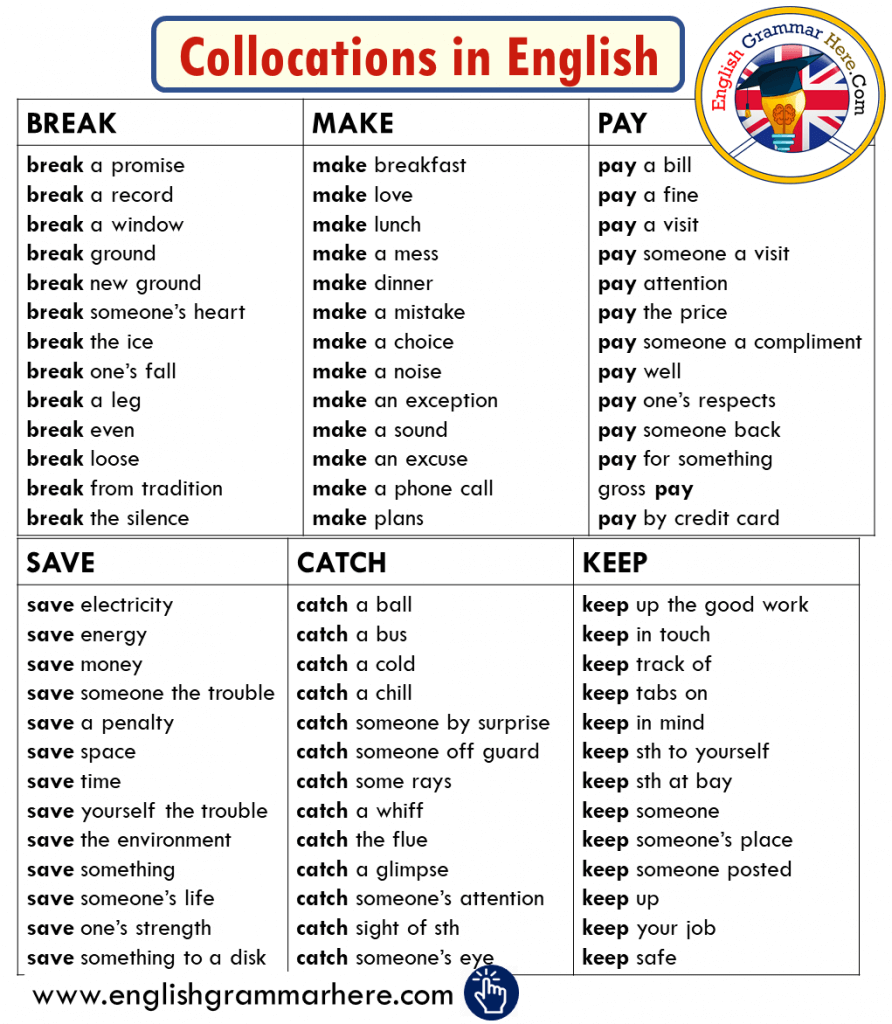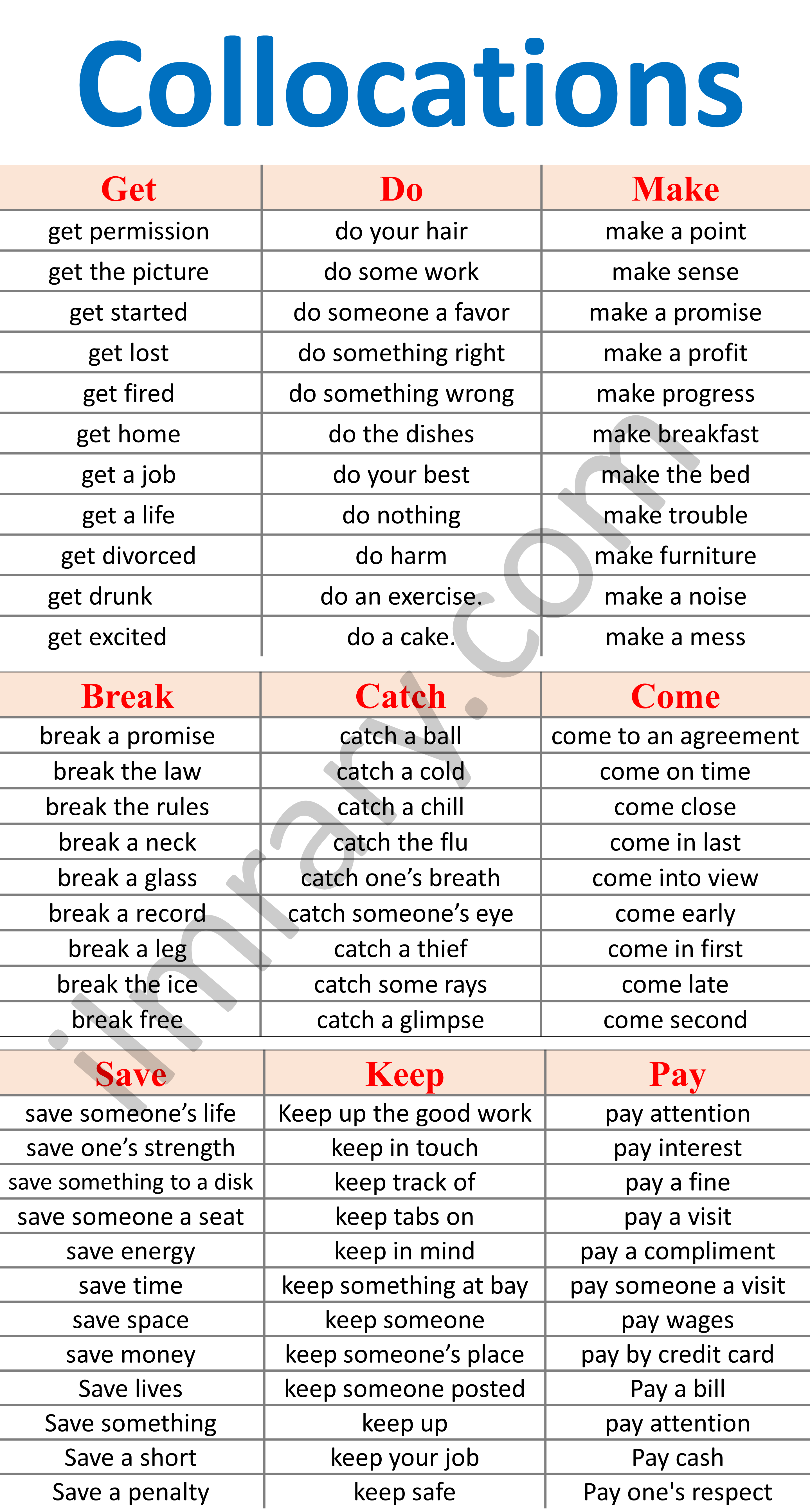
Common Collocations List of 100+ Useful Collocations in English ESLBUZZ
There are 7 types of collocations made from combinations of verbs, nouns and adjectives: adverb + adjective: Fully Aware adjective + noun: Regular Exercise noun + noun: Ceasefire Agreement noun + verb: Plane took off verb + noun: Commit Murder verb + expression with preposition: Run out of Gas verb + adverb: Whisper Softly

+1000 Collocations List from AZ in English English Grammar Here
come under attack. come up with. come to life. come prepared. come to a realization. come to terms with. come in last. come on time. come to power.

Common Collocations List of 100+ Useful Collocations in English ESLBuzz Learning English
Collocations List Collocations are very common in English, and learning them is important. A collocation is two or more words that often go together, like hard work or make a mistake. Collocations sound "right" or "natural" to native speakers, so the more collocations you use, the more natural your English will sound. Index of Collocations A B C D

Common Collocations List of 100+ Useful Collocations in English ESLBUZZ
List of Noun and Noun Collocations. A pang of nostalgia. A sense of pride. A surge of anger. Absentee ballot. Abuse of power. Account executive. Accounting firm. Accounting system.

Common Collocations List of 100+ Useful Collocations in English ESLBUZZ
Adverb + Adjective Collocation Examples: Ben and Jane are happily married. You are fully aware that there are serious problems. George was blissfully unaware that he was in danger. It's deeply competitive and transparent. I'm deeply worried about you. The train system has been deeply affected. I was deeply unhappy.

Verb Collocations List of 90+ Verb Collocations in English ESLBUZZ
There are several different types of collocation made from combinations of verb, noun, adjective etc. Some of the most common types are: adverb + adjective: completely satisfied (NOT downright satisfied) adjective + noun: excruciating pain (NOT excruciating joy) noun + noun: a surge of anger (NOT a rush of anger)

250+ Frequently Used Collocations List in English ESLBUZZ
The Academic Collocation List (ACL) is a list containing 2,469 of the most frequent and useful collocations which occur in written academic English. It can be seen as a collocational companion to the Academic Word List (AWL), consisting of collocations (or word combinations) rather than single words. The ACL was developed by Kirsten Ackermann and Yu-Hua Chen using the Pearson International.

Collocation 2500+ Collocations List from AZ with Examples TOEFL English collocations
Collocations examples - correct and incorrect: heavy rain -> correct strong rain -> incorrect run fast -> correct run quick -> incorrrect fast food -> correct speed food -> incorrect do the homework -> correct make the homework -> incorrrect fight hard -> correct fight tough -> incorrect well done -> correct good done -> incorrrect

Verb Collocations List of 90+ Verb Collocations in English ESLBUZZ
Examples of collocation lists Ackermann, K., & Chen, Y. (2013). Developing the Academic Collocations List (ACL): A corpus-driven and expert-judged approach. Journal of English for Academic Purposes, 12, 235-247. The ACL is featured in the Longman Collocation Dictionary and thesaurus and can also be accessed here.

Common Collocations List of 100+ Useful Collocations in English ESLBUZZ
1.play football 2.play golf 3.play badminton 4.grow up 5.grow hair 6.grow older 7.grow wiser 8.grow fruit 9.grow 2 inches 10.grow out of something 11.grow leisure time 12.grow quickly 13.grow slowly 14.begin to grow 15.grow wiser 16.grow up on something 17.grow a bread 18.grow a moustache 19.grow stronger

List of Collocations with Examples in English
Here are six common formats for collocations with examples: [adverb] + [adjective] Janet is not fully aware of the situation. The boss was extremely interested in your proposal. Your suggestion is utterly ridiculous. [noun] + "of" + [noun] It was an unusual chain of events. I have bought you a bar of chocolate. John received a round of applause.

English Collocations List of Common Collocations 7 E S L
Some typical collocation examples are " pay attention", "fast food", "make an effort", and "powerful engine". Collocations make it easier to avoid overused or ambiguous words like "very", "nice", or "beautiful", by using a pair of words that fits the context better and has a more precise meaning.

2500+ Common Collocations For English Learners 7 E S L
Examples include "make a decision," "take a break," or "give advice." Verb + Preposition: This type of collocation consists of a verb and a preposition that frequently occur together to create a specific meaning. Examples include "believe in," "depend on," or "listen to."

English Study Here
In this lesson you will learn common English collocations with 'have', 'do', 'make', 'take', 'break', 'catch', 'pay', 'save', 'keep', 'come', 'go' and 'get'. In this list you will find over 100 collocations that will enrich your vocabulary and help you to speak natural and fluent English. You can also download a free PDF of collocations below.

Useful Adjective Collocations with Adverb, Noun & Adjective • 7ESL English language learning
Examples: run quickly, speak softly, study diligently Verb-Preposition Collocations: Examples: look at, listen to, care for Adjective-Preposition Collocations: Examples: afraid of, interested in, famous for Noun-Preposition Collocations: Examples: aware of, similar to, good at Verb-Object Collocations: Examples:

Collocation 2500+ Collocations List From AZ With Examples 7 E S L
One example of a collocation is fast food. You cannot say quick food or fast meal because they sound unnatural. The same is true with a quick shower, which cannot be a fast shower. What Are the 7 Types of Collocations? There are seven popular types of collocation made by combining different parts of speech.